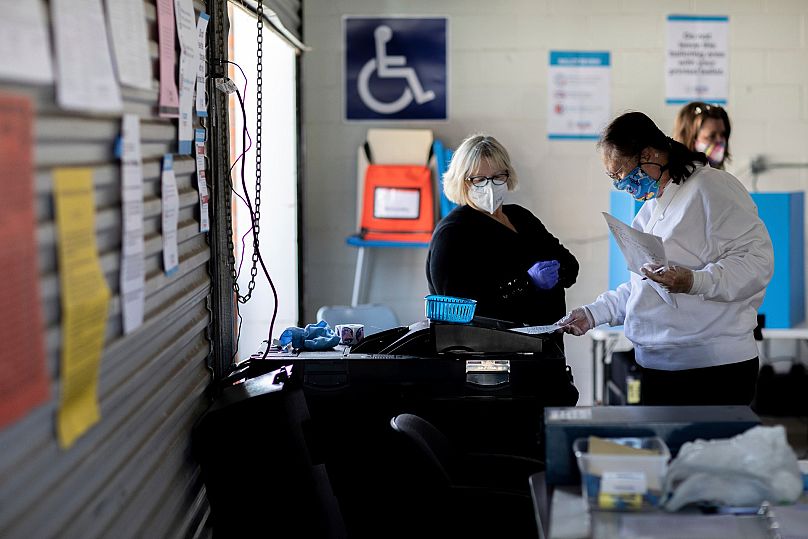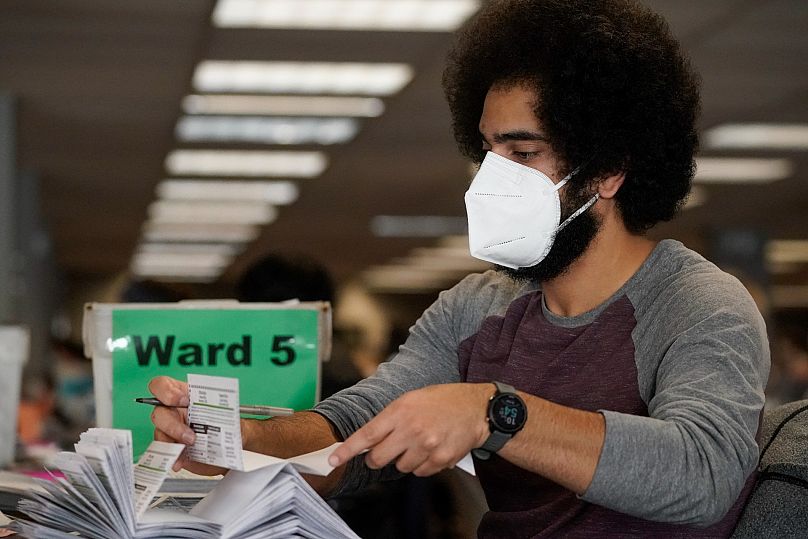These are the states you need to keep an eye out for as the results come in.
Swing states, battleground states, key states, call them what you will, these are where the Joe Biden and Donald Trump's campaigns have focussed their energy and funds in the run-up to Tuesday's vote.
These states are coveted by the candidates and watched closely by pollsters, political commentators and the media because victories in these states will almost inevitably decide the outcome of the ballot.
"California will vote Democrat and Texas will vote Republican ... both parties' interests are therefore elsewhere," Professor Frédéric Robert, senior lecturer in American civilisation at Jean University Moulin Lyon 3, told Euronews.
Prof Robert has identified eight key battleground states for this election:
Arizona
Trump won this desert state in the southwest, with its 11 electors, in 2016 with a 3.5% lead over Hillary Clinton.
A border state with Mexico, nearly a third of its population is made up of members of the Hispanic community and 5% are Native Americans.
Among the factors that may play a role in the election are a large population of retirees who feel threatened by the COVID-19 pandemic.
There is also the political legacy of John McCain, a former Republican candidate the 2008 US presidential election, who served as Arizona senator for more than 31 years and was one of Trump's most vocal critics. The president was not invited to the senator's funeral at the request of McCain himself.
According to the poll analysis site FiveThirtyEight, Biden is ahead of Trump by almost three points, according to an average of polls conducted in the state.
North Carolina
One of the US' original 13 colonies, former confederate state North Carolina saw Trump win by 3.6% over Hillary Clinton in 2016, thus taking its 15 electoral votes.
Since the 2000 presidential election, Barack Obama has been the only Democrat to win the state and that was just once in 2008.
The African-American community's vote will play an important role in this year's election; more than 22% of North Carolina's population comes from this community.
The same goes for evangelical Protestants — highly religious and traditionally conservative, they make up 35% of the state's population. Some are African-American, so there is an overlap between the two categories.
According to FiveThirtyEight, Biden is 2.5% ahead of Trump, according to an average of polls conducted in the state.
Florida
Probably the most famous of the key states, Florida and its 29 electors was won by George W Bush in 2000, despite great confusion surrounding the election, then again in 2004.
After Barack Obama claimed victory in the state in 2008 and 2012, Trump won back its 29 electors with a 1.2% lead over Hillary Clinton in 2016.
Today, one in five inhabitants is 65 or older; the coronavirus pandemic and the Trump administration's management of it will therefore likely greatly influence the election results.
Another factor at play here is the state's population with great racial and linguistic diversity. It has a large Hispanic community (26% of the population), of which a large part is of Cuban and African-American origin (17% of the population). What's more, 20% of its inhabitants were born abroad, as well as 30% of households speaking a language other than English, according to the US Census.
FiveThirtyEight's average put Biden 2.4 points ahead of Trump and the gap between them has been closing rapidly since the beginning of October.
Georgia
This southern state, with its 16 electors, could well be a surprise new key state in 2020.
Won by Trump with a 5% lead over Hillary Clinton last time around, things are much tighter today, particularly because of the state's demographic evolution (+9.6% inhabitants between 2010 and 2019) and the growth of Atlanta's suburbs and a diverse population (32.6% African-Americans, almost 10% Hispanics).
The state has not been won by a Democratic presidential candidate since Bill Clinton in 1992, but a change to this rule in 2020 would be "possible, but surprising in spite of everything," according to Robert.
FiveThirtyEight puts Biden 1.2% ahead of Trump, according to an average of polls conducted in the state.
Michigan
This Midwestern state was one of the surprises of 2016 — its 16 electors went for Trump, who defeated Hillary Clinton by 10,740 votes, or 0.2% of the votes cast, marking the narrowest victory of the presidential election.
Robert says that historically Michigan has swung between the two parties since the early 1930s. In 2016, Trump's anti-status-quo speech, which seduced part of the white electorate in the Rust Belt, a former industrial region now in crisis.
According to FiveThirtyEight's averages, Biden is currently 8.3 points ahead of Trump.
Minnesota
This Great Lakes state has voted for the Democratic candidate in every election since 1976.
Nevertheless, it is a possible source of concern for Democrats, as their share of votes has been steadily declining since 2008 and, demographically, Minnesota has a whiter population than the rest of the country.
White voters are Trump's main electoral block and he will be relying on them to win the state's 10 electoral votes.
FiveThirtyEight's average shows Biden currently 8 points ahead of Trump.
Pennsylvania
This East Coast state is a target for both candidates thanks to its 20 electors. In 2016, Trump defeated Hillary Clinton there by 44,292 votes out of 6.15 million — a margin of 0.72%.
It was also one of the holes in the Democrats' "blue wall" that Hillary Clinton would have had to win to become president.
Robert says that since 1912, the state "has chosen a Republican candidate 12 times and a Democratic candidate 13 times."
Since 1992, the electors have regularly sided with the Democrats and in a fairly unequivocal manner (54.7% to 44.3% in 2008 and 52% against 46.6% in 2012), the professor said.
The state is an energy producer and Trump has campaigned hard on the subject, arguing that Biden wants to ban hydraulic fracking — the reality is much more nuanced — which would affect the local industry, which is booming.
According to FiveThirtyEight, Biden is currently 5.3% ahead of Trump when looking at averages of the state's polls and the gap has been closing since mid-October.
Wisconsin
In 2016, Trump defeated Clinton by 22,748 votes with 3 million up for grabs — a margin of 0.7%. This was another fatal flaw in the Democrats' "blue wall"
Previously, the state had been leaning towards the Democratic camp, opting for them in every presidential election since 1988.
A point of concern for the Democrats this year, Wisconsin has a whiter population than the rest of the country: 87% compared to 76.3% nationally.
Trump will count on the white men in the state to win him 10 state's 10 electors again.
According to the poll analysis site FiveThirtyEight, averages put Biden currently 7.1 points ahead of Trump.
Can we trust the polls to predict the winner?
"As previous elections have shown, pollsters are often among the biggest losers," said Prof Robert.
"The elections in 2000 and 2016 are clear examples of this. Not to mention that it is highly likely that there will be 'hidden votes' for the incumbent president from people who don't publically declare their persuasion and he could therefore command a much higher score."














